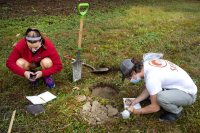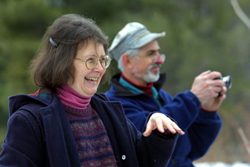
Longtime Maine grower and author discusses garden design
Longtime Maine grower and former Atlantic Monthly art director Terry Silber will talk about perennial garden design at 7 p.m. Tuesday, April 2, in the Muskie Archives.
For three decades, Silber and her husband, Mark, have owned Hedgehog Hill Farm, a commercial organic operation in Sumner, Maine. There they grow vegetables, herbs and flowers, and offer workshops on farming and gardening. They have written two books: Growing Herbs and Vegetables: From Seed to Harvest (Knopf, 1999) and The Complete Book of Everlastings: Growing, Drying, and Designing With Dried Flowers (Knopf, 1992).
As part of a program funded by the New York-based Andrew Mellon Foundation, the Silbers are also guest faculty at Bates this semester. They are teaching Working the Land: Thirty Years of Labor and Discovery on a Small Farm in Maine, a course based on their experiences with running a commercial organic farm in Maine. Part of the interdisciplinary environmental studies program, the course emphasizes an approach to farming that is flexible, modestly scaled and respectful of the natural environment.
The environmental studies grant is one of two the Mellon Foundation awarded to support learning-associates programs at Bates — teaching projects that bring in outside experts to enrich the curriculum with a “real-world” perspective and experience.



